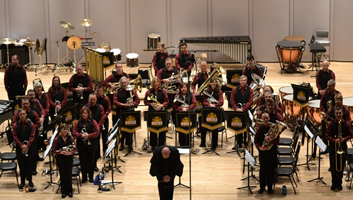Twelfth Night, one of the region’s most overproduced and yet under imagined Shakespearean titles, had been ripe for a roasting for some time now. So when, in the opening moments of South Stream Productions‘ season-opening show, rising director Hayley Philippart and actor and company co-founder Brook North began painting Orsino, Duke of Illyria, as a simp for all seasons, the telltale, savory and long overdue first tendrils of theatrical hickory smoke immediately grabbed our attentions.
By the time the inflamed passions of this absurd Romantic, an uneasy amalgam of Ernie Kovacs and Charles Baudelaire, were momentarily overcome by stage veteran Julie Oliver’s deliberately less-than-soulful trumpet stylings on “Annie Lisle” (better known hereabouts as “Hark the Sound”), the aesthetic cookout was definitely on.
Further confirmation came in Twelfth Night‘s second scene, where central character Viola, who’s just been beached from a shipwreck that she thinks has killed her brother Sebastian, immediately concludes that her best course of action in this foreign country is obviously to impersonate a young man and hire on in the service of its ruler.
Here, Philippart bids her actors strip all the varnish off Shakespeare’s slapdash exposition and unlikely plot. Young actor Miranda Curtis’ blithe recital of Viola’s utterly hare-brained scheme gets its true deserts: a long pause and a cockeyed, exasperated look from seasoned actor Barrett as the captain of the ship just sunk. Then Viola’s money talks, the die is cast, and we’re off to the races.
With director and cast openly ridiculing various noble and romantic quests in these frequently rewarding comic takes, South Stream’s return to live theater after a half-decade hiatus is hardly a sacred Shakespearean recital. And for the most part, so much the better, as fuel for the farce comes here from robust and sometimes reimagined sources.
Pulses flutter as seldom-seen stage veteran Olivia Griego digs into the duende – well, sort of – as a dark Sabastian all but ripped from the cover of a romance novel. Alongside North’s worthy take on genial miscreant Sir Toby Belch, Natalie Turgeon’s inspired work makes boon companion Sir Andrew Aguecheek a walking collection of deeply dated dance floor moves and expired pop culture mic checks, exuberantly executed throughout with the swagger of a truly clueless fratboy. These are accompanied by Oliver’s nimble-witted fool, Feste, and the fiendishly resourceful maid, Maria (young standout Akili Holder-Cozart).
In this deft re-reading, director Philippart, actor Barrett, and costumer Sally Beale fashion central character Olivia, the thoroughly disinterested object of Orsino’s affectations, as a woman who has carved out enough agency and maneuvering room in her culture to command a sizeable estate following the deaths of her father and brother. Having tasted that freedom (in a commanding riding coat and boots no less), Olivia’s understandably loathe to quickly leave it.
More fresh air enters the room as most of the central relationships are reexamined. If Orsino’s a precious, self-tortured nobleman mostly in love with the idea of unrequited love, then Viola would be a fool to fall for him. So does she? Philippart and Curtis don’t convince us of this here and, truth be told, the potential interplay among these and other characters remains a lot more interesting if she doesn’t. That leaves more room for the show to probe the queer underpinnings of Olivia and Orsino’s interactions with Viola’s alter-ego, the supposedly male Cesario, as well as the allegiance between saving seafarer Antonio (Holder-Cozart) and the swarthy Sabastian.
Thus far, though, we’ve made no mention of the element that takes this production into the realm of meta-farce. No matter how well-deserved, it takes guts for a company to roast the Bard’s more melodramatic quirks. But arguably the most daring target here by far is independent theater itself.
For more than a quarter-century now, I’ve repeatedly witnessed and often told the sometimes heroic (and frequently quixotic) tales of independent stage companies that have routinely constituted the largest sector of the region’s community of practice.
Usually understaffed, always undercapitalized (and, when the pitfalls of weather, life and illness disrupt production calendars, occasionally under-rehearsed as well), these driven bands of creatives sacrifice on average at least one labor-year in mounting even the most modest productions, often in locales non-conducive to live theater.
Bare Theatre bravely took the Bard to the drinking masses in productions of ShakesBEER, years before Sweet Tea Shakespeare foregrounded the challenge of staging Henry IV, Part II – for just a single weekend – with a quartet of actors.
So it’s nothing remotely new when a company tries to mount a show with insufficient help or in less than optimal circumstances (a concept Scrap Paper Shakespeare threatens to take to new extremes in their upcoming January 27th production of Much Fear Shakespeare).
What is new, though, is when such a company mounts a show about such a company mounting such a show with insufficient resources and help.
For garish portable LED lights on poles and black drapes on pipes circumscribe the corners and back of a venue currently called The Ridge, a fellowship hall provisionally repurposed for theater on the campus of Raleigh’s Ridge Road Baptist Church.
Rolling metal wardrobe racks festooned with costumes not only form an upstage line of scrimmage across the performance space; they also serve as a hedge behind which Sir Toby, Andrew and Maria hide and peek as Olivia Griego’s hilarious Malvolio falls into their snare.
Further on, they also make a momentary hideout for Emma Ives, who serves as the show’s one-person running crew and designated whipping child when the wheels start falling off. For we come to learn as the show unevenly proceeds: even with doubling and tripling roles, seven people can’t stage Twelfth Night. Or, at least, these seven can’t.
Improvised responses to various disasters multiply as that awful truth slowly unfolds. Actors and crew hiss curses and ultimatums before brazening out a number of unfortunate forced production choices.
As those who caught Theatre Raleigh’s on-again, off-again production of The Show That Goes Wrong last season may well recall, it’s much harder than it looks to make pre-programmed, simulated mistakes keep looking real. Here, the careening sense of catastrophe, the lucky saves and the luckless shamefaced fails in the latter acts often bear the stamp of authenticity.
The even more remarkable thing? How this show still doggedly hangs together, for all the funny falls apart.
All of these elements make this Twelfth Night a calculated hit piece from the inside; a very knowing, very funny love letter to the abiding ingenuity needed for theater on a shoestring – as well as its verifiable limits. Highly recommended.
This performance runs through Sunday, January 21. See our sidebar for details.












